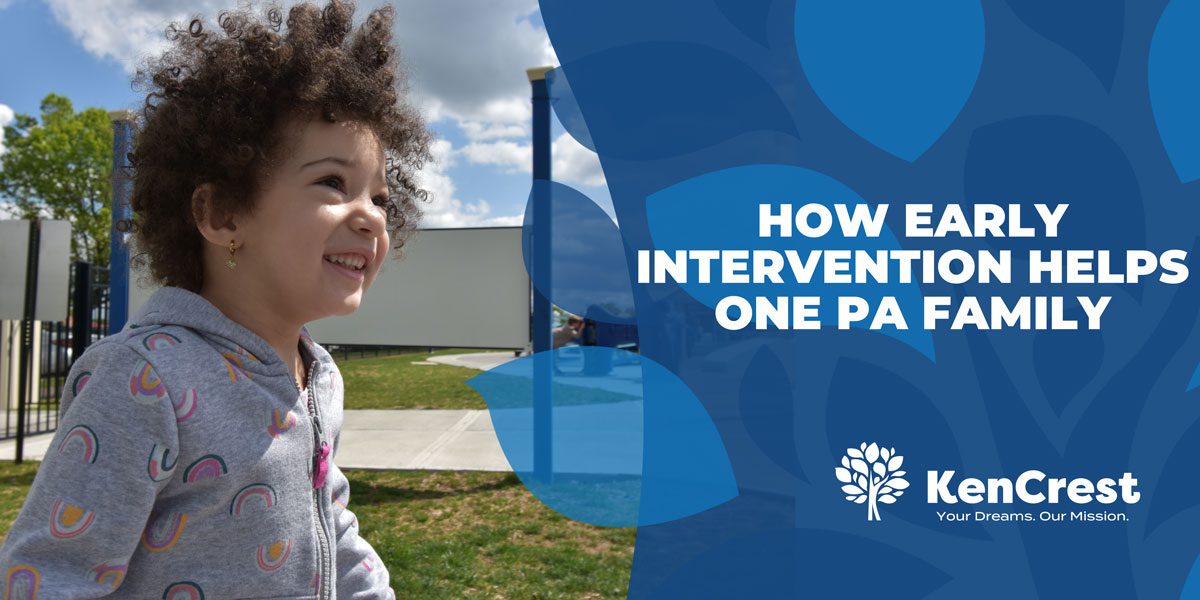How Early Intervention Helps One PA Family

After not meeting her talking milestone at two years old, this family sought Early Intervention help and found KenCrest.
By Sydney Kerelo
With pep and a brilliant smile, two-year-old (almost three-year-old) Ava bounced onto the Northampton Township Municipal Park playground for a KenCrest community day event. At first, she was shy, but quickly came out of her shell as she ran around the playground while her parents, Shanteese and Anthony, followed behind.
Ava began receiving Early intervention support through KenCrest after her mother, Shanteese, noticed she was advancing with her fine motor skills, but not her communication.
“When Ava turned two, we started getting a little concerned,” says Shanteese. “That March, she started having these small seizure-like symptoms where she would shutter, tense up, and shake. But once it was done, she would return to playing like it didn’t happen. We took her to the Children’s Hospital of Philadelphia (CHOP), where they said she would grow out of them. But they did say her speech is delayed, so we went to the pediatrician, and they had a referral ready for us for Early Intervention.”

Soon after, Ava began receiving services, and her parents noticed her enormous progress. According to Shanteese, before Ava wouldn’t engage with them, she wouldn’t hold their hands or meet their eye contact. But after she started Early Intervention, she began grabbing her parents’ faces, caressing their cheeks, and became so much more expressive.
After a few months of weekly speech therapy, Ava quickly began picking up sounds and was able to string them together to create words. She can say “hi dad” and “hi mom” now and has learned how to show what she wants from her parents. When she wants water, she brings the cup to Mom or Dad and then brings the water over to indicate that she’s thirsty. She’s learned sign language and can sign if she’s hungry.
To continue encouraging her to speak, Christie, Ava’s speech therapist, told Shanteese and her husband to begin imitating her and signing it afterward. For example, when Ava wanted more of something, her parents would do the sign for more, and then as they were saying it, they would give it to her and then encourage her to ask for it herself when she wanted more.
“She did meet with her school psychologist and other specialists who diagnosed her with Autism,” says Shanteese. “So, when she starts school, she’ll be in the Bucks County Intermediate Unit, where she will receive services to support her growth.”
Ava’s diagnosis was hard for her family, but it taught them greater patience. Once Shanteese learned about Ava’s Autism, they could slow down their world and see it from her side. They stopped rushing her to speak and began taking little steps to help her improve at her own pace.

“We didn’t know what we were doing, we were trying to get her to absorb all this stuff, and it just wasn’t working,” says Shanteese. “We were getting frustrated, she was getting frustrated, so when we took a step back and evaluated our options, and what was best for her, it gave us all peace of mind.”
We started doing Early Intervention with her and then Early Head Start—a federally funded program to promote school readiness for children ages 3 to 5. Now Ava sees therapists several times a week for educational support.
Since doing Early Intervention and Early Head Start, Ava’s relationships with her peers has improved. When Shanteese’s niece and Ava were playing together, she began to cry, and Ava walked up to her, looked directly into her eyes to make sure she saw tears, and then wiped her face for her gently. According to Shaneteese, Ava wouldn’t have done this before she began receiving Early Intervention services.
“I will say she has accomplished so much in the past year, and I couldn’t be prouder of her,” says Shanteese. “She’s my baby; if she struggles, I struggle with her. We are one and the same, and she’s already so independent, but seeing her grow and reach out to us when she wants things feels so good.”
In the United States, approximately one in every six children faces a developmental disability or delay, according to We Care Children. Concerned your child might be experiencing a developmental delay? Visit your pediatrician or the Pennsylvania Department of Education’s website to make a referral.
Learn more about KenCrest’s Early Intervention program by clicking the link below.
